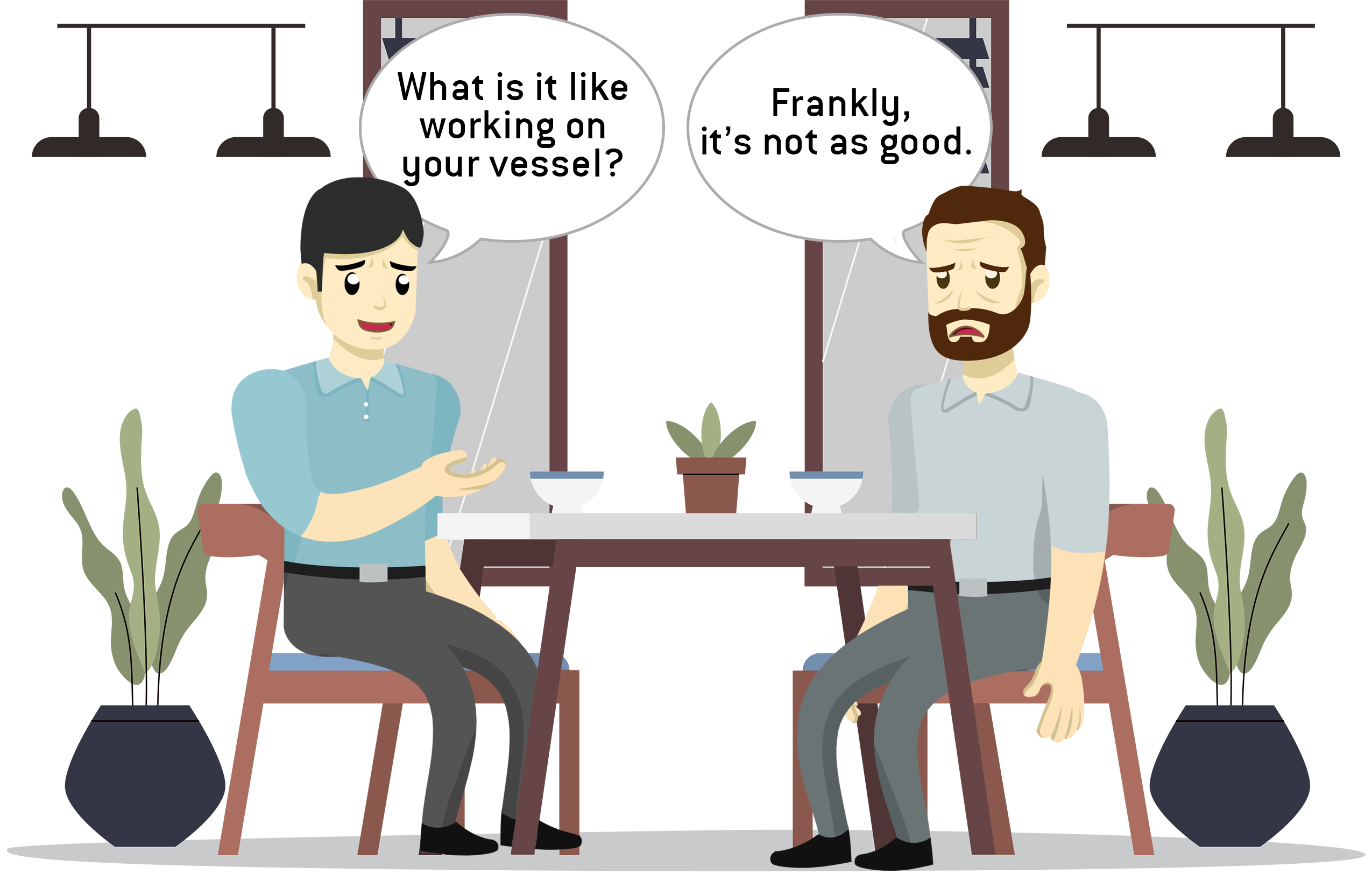
AB John is on shore leave when he accidentally meets AB James, a classmate from the maritime school. AB John finds out that the vessel AB James is assigned on is docked at the same port, and the latter has also scheduled his leave for that day. The two decide to have lunch together to catch up. After exchanging stories about their personal lives, they also talk about their jobs as seafarers.
| John: | So, what is it like working on your vessel? |
| James: | Great! I thought it would be difficult since we have crew from different countries. But all officers are approachable and respectful, and the ratings are always given a chance to speak up. Tasks are completed smoothly, and I feel very satisfied with work. It’s only been three months since I started in this company, and I’m already thinking of renewing my contract. |
| John: | Lucky you! |
| James: | Why? What is it like working on your vessel |
| John: | Frankly, it’s not as good. The officers are very skilled at their jobs, but they can also be hard on the ratings. One time I tried making a suggestion during a safety meeting, and the officer replied, “I have already made the decision. And to be honest, you do not have the expertise to comment on this matter.” I felt embarrassed in front of the crew, so I decided never to participate in discussions anymore. |
Imagine somebody asked you the same question “What is it like working on your vessel?”, how would you reply? Your answer to this question best describes what is called the “on-board culture”.
What is the on-board culture?
On-board culture refers to the shared values, norms, routines, or system of doing that are commonly practiced by all or majority of the crew members. Simply put, it is the way of work and life on board a vessel – the way things are done on board. The promotion of trust, respect, positivity, and engagement among crew members falls under on-board culture.
Why does the on-board culture matter?
The on-board culture covers various conditions which crew members see and experience but rarely talk about. Although often overlooked by common performance indicators, these human factors greatly affect the safe and efficient completion of tasks on board. Developing these conditions can help address and prevent undesirable events caused by human errors.
Who shapes the on-board culture?
The behaviour of the senior management has tremendous influence on the on-board culture. If leaders behave according to desirable values such as respect, honesty, integrity, and trust, the crew members will likely observe the same values in their dealings with one another. Nevertheless, without the crew’s active participation in strengthening the on-board culture, it will be difficult for the leaders alone to facilitate positive change. Ultimately, all crew members – from the ratings to the Master – are responsible for shaping the on-board culture.

An on-board culture aligned with the company values and built around trust, respect, and cultural awareness allows seafarers to perform their tasks efficiently and safely and live their lives on board peacefully and comfortably.
How is the culture on board my vessel?
The crew who form part of the vessel community are in the best position to examine the on-board culture. Do crew members contribute to company values and goals? Are leaders able to create a trusting and respectful culture on board? Are the crew aware of and respectful of cultural differences? The crew’s perception of these conditions can reveal the maturity level of the on-board culture.
How can Safety Delta help?
Safety Delta recognises the importance of developing the on-board culture not only in ensuring safety on the job but also in upgrading the general well-being of the crew. Thus, we introduce Leading the on-board culture as a new safety area in the Safety Delta universe. ![]()
In the Diagnosis stage, the crew’s perception of the on-board culture is measured. Then the Dialogue stage offers an opportunity for the crew to discuss the crew’s perception and identify ways to improve and sustain the relevant safety conditions. Finally, in the Development stage, the Safety Delta Learning Library provides training materials to support the shaping of the on-board culture.
We encourage you to visit the SDLL and check the following subjects:
- Turning company values into behaviours
- Positivity at work
- Harassment and bullying
- Conflict handling
- Leadership styles
- Cultural awareness and bias
- Communicating across cultures
Among Us is a monthly digital newsletter, primarily for Safety Delta members, but also for those who want to get a ‘sneak peek’ at the experiences gained by those of us who are already ‘insiders’. It also presents the developments of Safety Delta.

